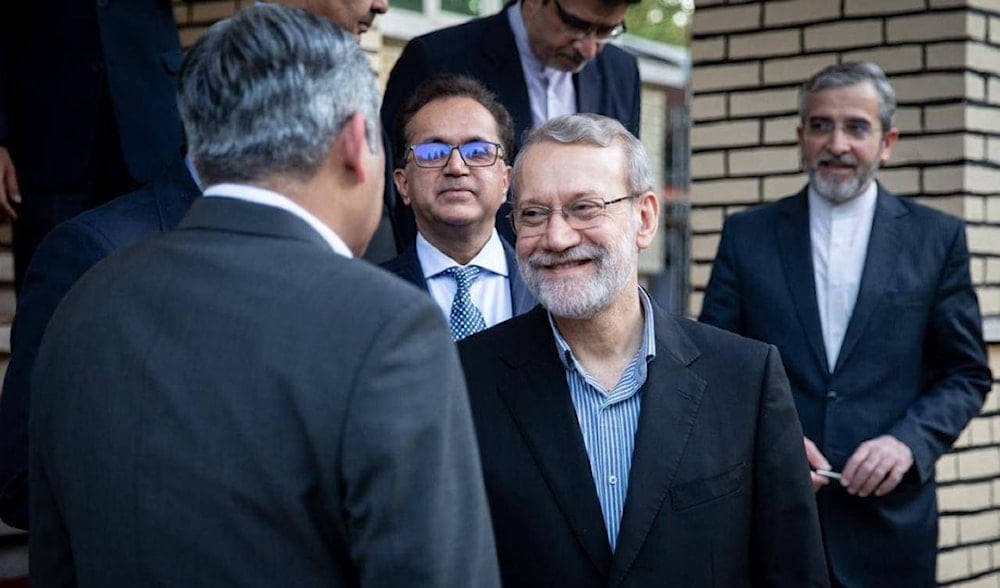Larijani’s Pakistan visit signals strategic regional alignment: Excl.
Ali Larijani’s visit to Pakistan signals a turning point in Iran-Pakistan relations, with Tehran eyeing a strategic alliance that reshapes regional power dynamics.
-

Ali Larijani, Secretary of Supreme National Security Council (SNSC) and Pakistan's Ambassador to Iran in the background (X/@AmbMudassir)
Secretary of Iran’s Supreme National Security Council Ali Larijani's visit to Pakistan marks a significant turning point in regional geopolitics, sources told Al Mayadeen. The visit is seen as laying the groundwork for a strategic alliance between Tehran and Islamabad, one that moves beyond the limits of traditional bilateral cooperation.
According to the sources, Tehran views the visit as a practical step toward redrawing the balance of power in both South Asia and West Asia, particularly in light of growing regional instability and efforts by external powers to impose new realities on the region’s security architecture.
The sources emphasized that Iran considers this strategic engagement crucial in countering regional threats and in asserting a collective security framework free from foreign interference.
For Iran, the strategic defense agreement between Pakistan and Saudi Arabia is a positive move that could reinforce regional stability. The sources added that Tehran supports the expansion of such understandings, noting that they can reduce the risk of escalation and limit the influence of foreign-imposed agendas.
H.E. Mr. Ali Larijani, Secretary of Supreme National Security Council (SNSC) and Representative of the Supreme Leader at the SNSC, is undertaking a visit to Pakistan today. The visit is part of extensive interactions between leaderships of two countries to reinforce our ties. The… pic.twitter.com/wJ9rYY7sxG
— Ambassador Mudassir (@AmbMudassir) November 24, 2025
Iran open to joining Islamabad-Riyadh defense pact
Tehran has expressed readiness to contribute to collective defense cooperation, including direct coordination with both Pakistan and Saudi Arabia. Iranian officials consider such cooperation as an essential path toward securing the region, independent of US pressure or intervention.
In this context, Iranian Parliament Speaker Mohammad Bagher Ghalibaf stated earlier in November that Tehran is open to joining the recently signed defense agreement between Pakistan and Saudi Arabia.
Speaking to Pakistan’s Geo News, Ghalibaf urged member states of the Organization of Islamic Cooperation (OIC) to consider establishing a joint military force similar to NATO.
His comments came as senior Iranian and Pakistani officials continue to stress the importance of strengthening bilateral cooperation. During his parliamentary visit to Islamabad, Ghalibaf met National Assembly Speaker Ayaz Sadiq and expressed appreciation for Pakistan’s solidarity with Iran amid the ongoing Israeli aggression.
He further highlighted the enduring friendship between the two nations and said cooperation can expand across political, economic, and cultural sectors.
KSA-Pakistan agreement in response to Israeli strike on Doha
In September, Saudi Arabia signed a strategic mutual defense agreement with Pakistan, marking a significant shift in Saudi Arabia-Pakistan ties and signaling Riyadh's intent to diversify its security alliances amid rising regional tensions.
The agreement, signed in Riyadh by Crown Prince Mohammad bin Salman and Pakistan’s Prime Minister Shehbaz Sharif, states that "any aggression against either country shall be considered an aggression against both."
The pact follows "Israel’s" missile strike on Doha, which targeted Hamas political leaders based in Qatar, a move that alarmed Gulf states traditionally reliant on the US as their primary security guarantor. Doha hosts a key American military base and is considered a major non-NATO ally of Washington.
Riyadh informed Washington of the Pakistan agreement after its signing, underscoring its desire for broader strategic autonomy in response to increasing unpredictability in US foreign policy and unrestrained military actions by "Israel" across the region.
Read more: Saudi-Pakistan defense pact reshapes Gulf balance rattles India

 3 Min Read
3 Min Read








